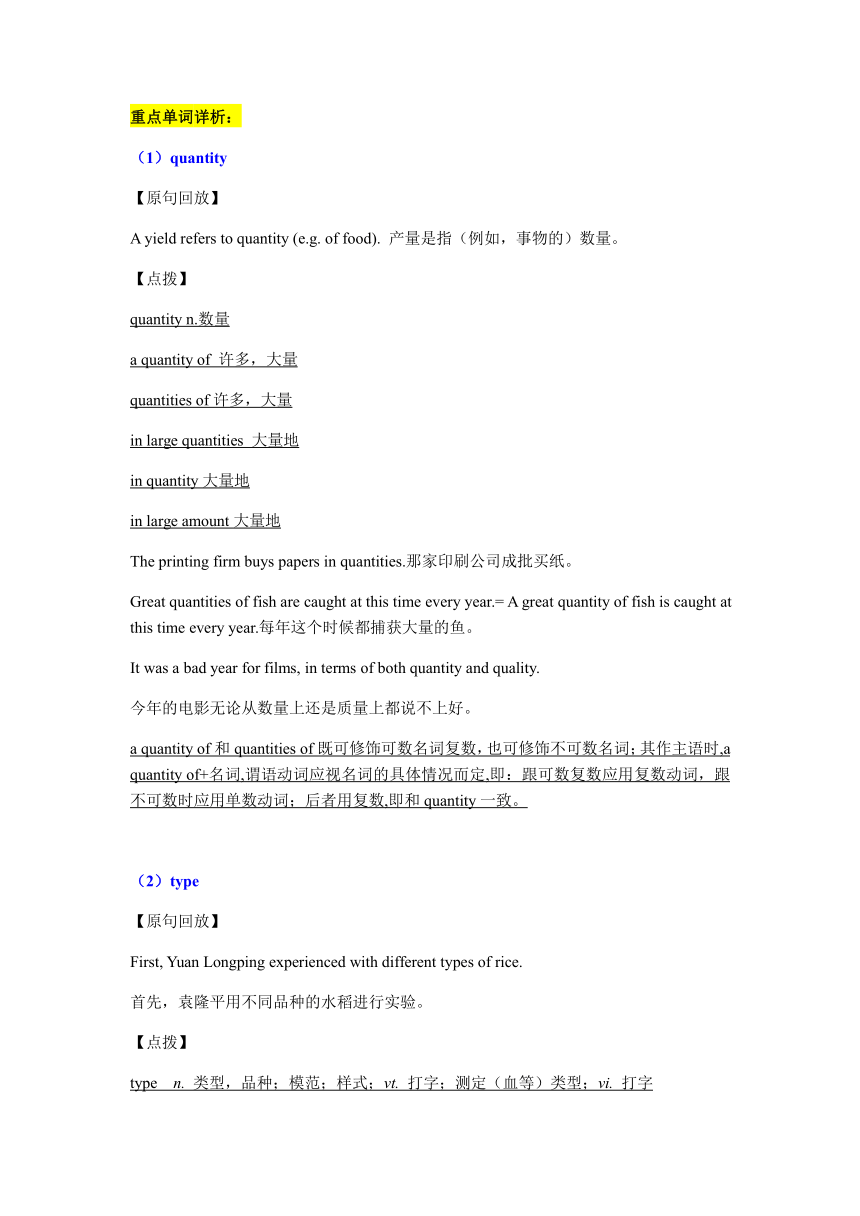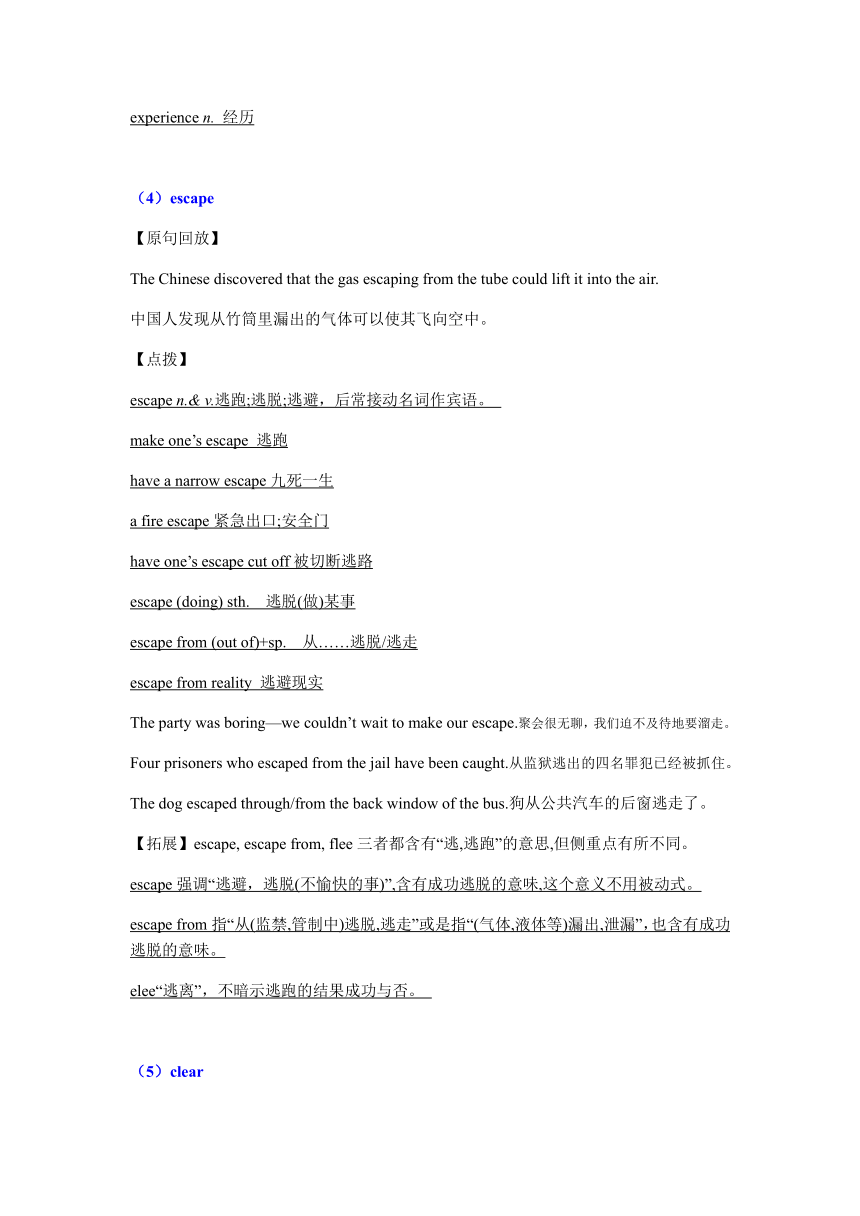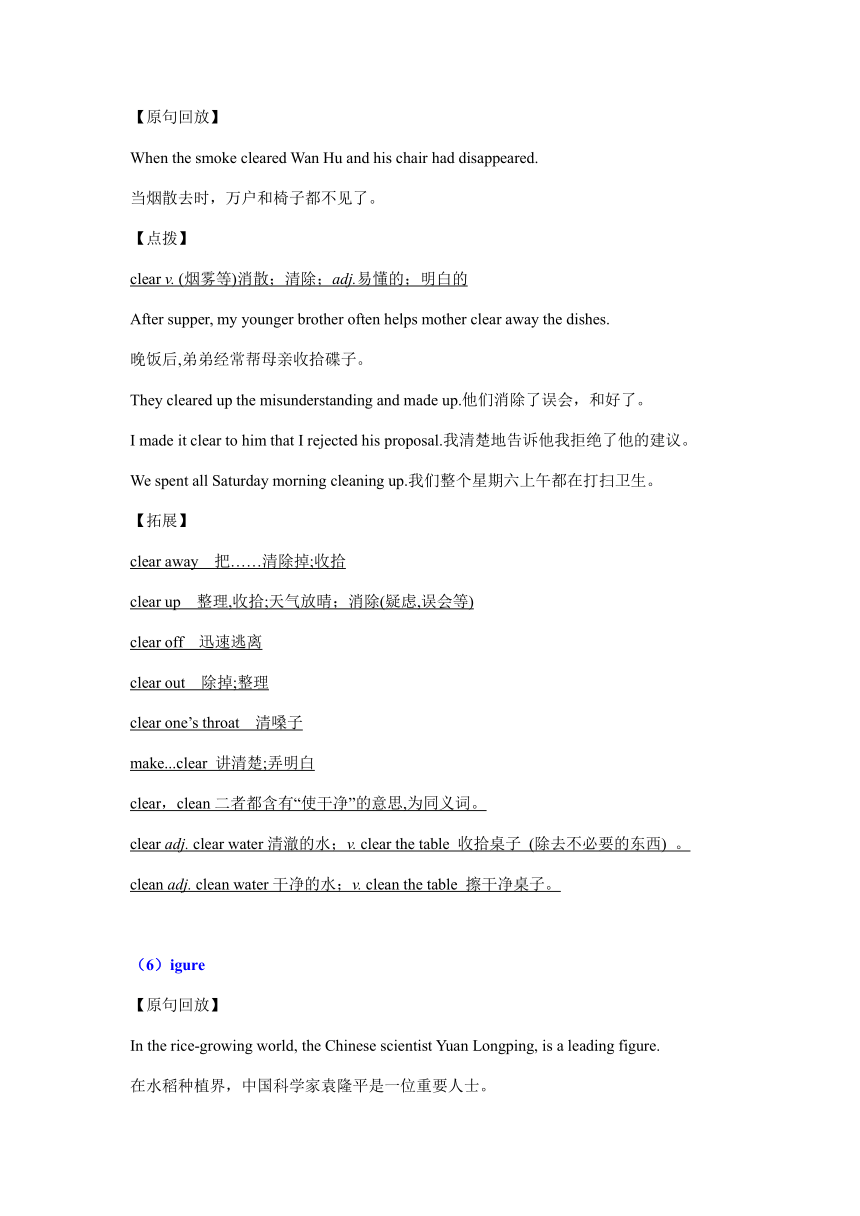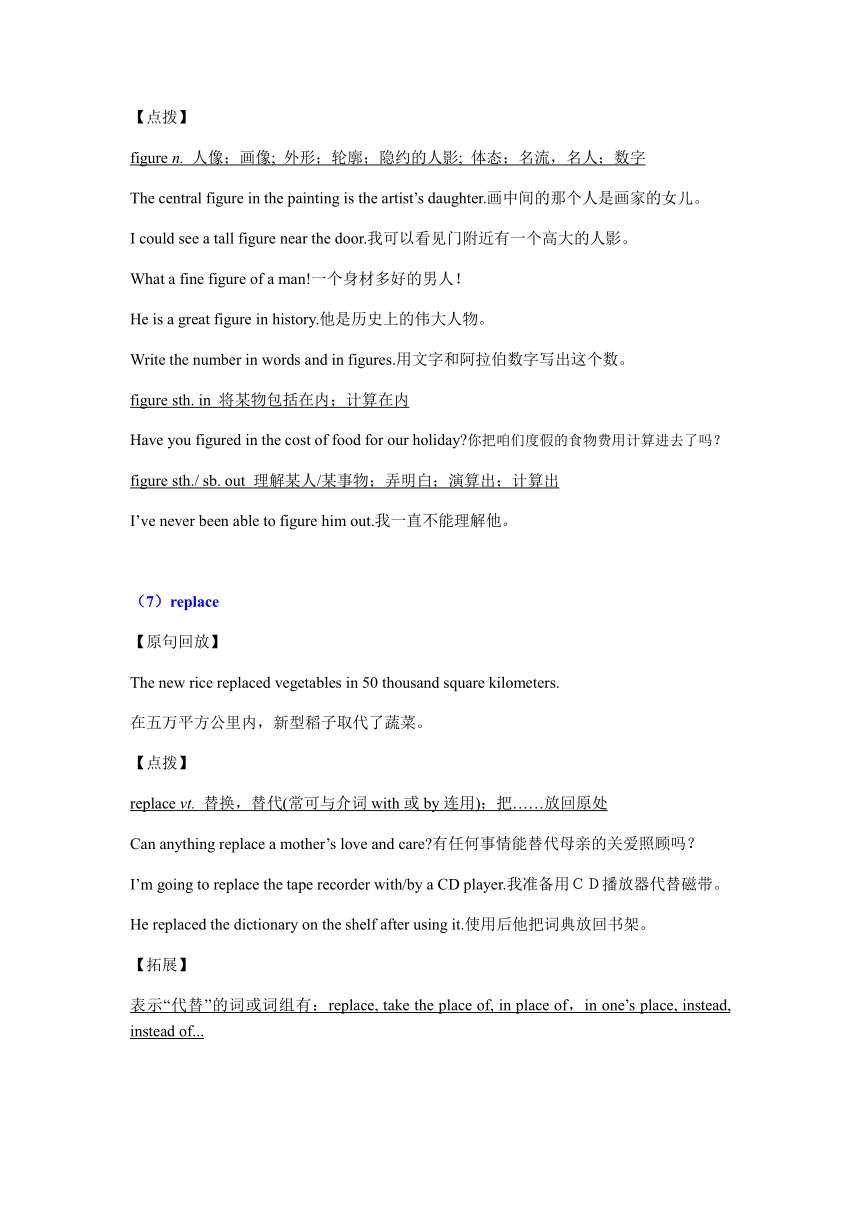外研版必修四Module 4 Great Scientists知识点详析及练习(有答案)
文档属性
| 名称 | 外研版必修四Module 4 Great Scientists知识点详析及练习(有答案) |  | |
| 格式 | zip | ||
| 文件大小 | 65.5KB | ||
| 资源类型 | 教案 | ||
| 版本资源 | 外研版 | ||
| 科目 | 英语 | ||
| 更新时间 | 2020-02-20 21:38:41 | ||
图片预览





文档简介
重点单词详析:
(1)quantity
【原句回放】
A yield refers to quantity (e.g. of food). 产量是指(例如,事物的)数量。
【点拨】
quantity n.数量
a quantity of 许多,大量
quantities of许多,大量
in large quantities 大量地
in quantity大量地
in large amount大量地
The printing firm buys papers in quantities.那家印刷公司成批买纸。
Great quantities of fish are caught at this time every year.= A great quantity of fish is caught at this time every year.每年这个时候都捕获大量的鱼。
It was a bad year for films, in terms of both quantity and quality.
今年的电影无论从数量上还是质量上都说不上好。
a quantity of和quantities of既可修饰可数名词复数,也可修饰不可数名词;其作主语时,a quantity of+名词,谓语动词应视名词的具体情况而定,即:跟可数复数应用复数动词,跟不可数时应用单数动词;后者用复数,即和quantity一致。
(2)type
【原句回放】
First, Yuan Longping experienced with different types of rice.
首先,袁隆平用不同品种的水稻进行实验。
【点拨】
type n. 类型,品种;模范;样式;vt. 打字;测定(血等)类型;vi. 打字
There are various types of the disease.该疾病有各种类型。
I was rather an outdoor type.我是那种特别喜欢户外运动的人。
Like any other type of equipment it requires regular servicing.
它和其他类型的设备一样,也需要定期检修。
It is a rare blood type. 这是罕见的血型。
Could you type this letter for me?你能为我打这封信吗?
(3)experiment
【原句回放】
First, Yuan Longping experienced with different types of rice.
首先,袁隆平用不同品种的水稻进行实验。
【点拨】
experiment n. 试验;实验;尝试;vi.尝试;做实验,
make/carry out/do/ perform/try an experiment 做实验
experiment in做……方面的实验
experiment on/upon 在……身上做实验
experiment with 以……做试验
be proved by experiment 用实验证明
The researchers are repeating the experiment on rats.研究人员用老鼠反覆做该试验。
Don't experiment with such dangerous drugs.不要用这种危险的药物做实验。
He argued that the experiment could be done in another way.
他论证说这项实验可以换一种方法进行。
【拓展】
experimental adj. 试验的,实验的
experimenter n. 实验者
experience n. 经历
(4)escape
【原句回放】
The Chinese discovered that the gas escaping from the tube could lift it into the air.
中国人发现从竹筒里漏出的气体可以使其飞向空中。
【点拨】
escape n.& v.逃跑;逃脱;逃避,后常接动名词作宾语。
make one’s escape 逃跑
have a narrow escape九死一生
a fire escape紧急出口;安全门
have one’s escape cut off被切断逃路
escape (doing) sth. 逃脱(做)某事
escape from (out of)+sp. 从……逃脱/逃走
escape from reality 逃避现实
The party was boring—we couldn’t wait to make our escape.聚会很无聊,我们迫不及待地要溜走。
Four prisoners who escaped from the jail have been caught.从监狱逃出的四名罪犯已经被抓住。
The dog escaped through/from the back window of the bus.狗从公共汽车的后窗逃走了。
【拓展】escape, escape from, flee三者都含有“逃,逃跑”的意思,但侧重点有所不同。
escape强调“逃避,逃脱(不愉快的事)”,含有成功逃脱的意味,这个意义不用被动式。
escape from指“从(监禁,管制中)逃脱,逃走”或是指“(气体,液体等)漏出,泄漏”,也含有成功逃脱的意味。
elee“逃离”,不暗示逃跑的结果成功与否。
(5)clear
【原句回放】
When the smoke cleared Wan Hu and his chair had disappeared.
当烟散去时,万户和椅子都不见了。
【点拨】
clear v. (烟雾等)消散;清除;adj.易懂的;明白的
After supper, my younger brother often helps mother clear away the dishes.
晚饭后,弟弟经常帮母亲收拾碟子。
They cleared up the misunderstanding and made up.他们消除了误会,和好了。
I made it clear to him that I rejected his proposal.我清楚地告诉他我拒绝了他的建议。
We spent all Saturday morning cleaning up.我们整个星期六上午都在打扫卫生。
【拓展】
clear away 把……清除掉;收拾
clear up 整理,收拾;天气放晴;消除(疑虑,误会等)
clear off 迅速逃离
clear out 除掉;整理
clear one’s throat 清嗓子
make...clear 讲清楚;弄明白
clear,clean二者都含有“使干净”的意思,为同义词。
clear adj. clear water清澈的水;v. clear the table 收拾桌子 (除去不必要的东西) 。
clean adj. clean water干净的水;v. clean the table 擦干净桌子。
(6)igure
【原句回放】
In the rice-growing world, the Chinese scientist Yuan Longping, is a leading figure.
在水稻种植界,中国科学家袁隆平是一位重要人士。
【点拨】
figure n. 人像;画像; 外形;轮廓;隐约的人影; 体态;名流,名人;数字
The central figure in the painting is the artist’s daughter.画中间的那个人是画家的女儿。
I could see a tall figure near the door.我可以看见门附近有一个高大的人影。
What a fine figure of a man!一个身材多好的男人!
He is a great figure in history.他是历史上的伟大人物。
Write the number in words and in figures.用文字和阿拉伯数字写出这个数。
figure sth. in 将某物包括在内;计算在内
Have you figured in the cost of food for our holiday?你把咱们度假的食物费用计算进去了吗?
figure sth./ sb. out 理解某人/某事物;弄明白;演算出;计算出
I’ve never been able to figure him out.我一直不能理解他。
(7)replace
【原句回放】
The new rice replaced vegetables in 50 thousand square kilometers.
在五万平方公里内,新型稻子取代了蔬菜。
【点拨】
replace vt. 替换,替代(常可与介词with或by连用);把……放回原处
Can anything replace a mother’s love and care?有任何事情能替代母亲的关爱照顾吗?
I’m going to replace the tape recorder with/by a CD player.我准备用CD播放器代替磁带。
He replaced the dictionary on the shelf after using it.使用后他把词典放回书架。
【拓展】
表示“代替”的词或词组有:replace, take the place of, in place of,in one’s place, instead, instead of...
(8)measure
【原句回放】
Measure can be explained as “to find out how long, wide, heavy, etc something is”. Measure可以解释为:弄清楚某物多长、多宽、多重……
【点拨】
measure n. 措施;量度;尺寸;程度;办法;v. 测量;比较;给予;权衡
He wanted the suit made to his own measure.他想要这套西装照他自己的尺寸做。
You are right in some measure.从某种程度上来说你是对的。
He measured his words with caution.他仔细斟酌着字句。
They measured the height of the ceiling.他们测量了天花板的高度。
Measure for measure. 一报还一报。
be measured in 以……计算、测量
take measures 采取措施
The government has taken measures to restrain inflation.政府已采取措施控制通货膨胀。
(9)cross
【原句回放】
He thought there was only one way to do this — by crossing different species of rice plant, and... 他认为,唯一的办法是使不同种类的水稻杂交,这样……
【点拨】
cross n. 交叉,十字;十字架,十字形物;vi. 交叉;杂交;横过;vt. 杂交;渡过;使相交;adj. 交叉的,相反的;乖戾的;生气的
Red Cross 红十字会
cross out 删去;划掉;取消;删除
cross over 横渡
The experts in the zoo tried to cross a leopard with a lion.动物园里的专家们试图使豹与狮子杂交。
It’s very dangerous for children to cross the busy street.对孩子们来说,穿过车来车往的街道很危险。
Meet me at the point where the two paths cross.我们在那两条路的交叉点见面吧。
If you can’t sign your name, make a cross instead.你如果不会签名,画一个十字也可以。
He was very cross because his roommate took his umbrella without getting his permission.
他非常生气,因为他的室友未经同意就把他的伞拿走了。
重点短语详析:
(1)bring in
【原句回放】
Researchers were brought in from all over China to develop the new system.
全国的研究者都被召集来开发这个新的体系。
【点拨】
bring in请来;引进;赚钱;收割庄稼
They’ve brought in experts to advise on the project.他们已请来专家对该项目提供意见。
They have brought in some advanced equipment.他们引进了一些先进设备。
【拓展】
bring on导致,促成;使……发展/进步
bring out阐释;出版(书籍等);发挥
bring up教育;养育;提出;呕吐
bring about引起;导致
bring back归还;使记起;使恢复
bring down使落下
(2)the key to
【原句回放】
He thought that the key to feeding people was to have more rice and to produce it more quickly. 他想,养活世人的关键是更多更快地生产大米。
【点拨】
the key to... ……的关键
其中to是介词,其后要跟名词、代词或动名词,类似的用法还有:
the answer to the question 问题的答案
the key to the door 门的钥匙
notes to the text 课本注释
an end to the meeting 会议的结束
the entrance to the building 大厦的入口
(3)search for
【原句回放】
Then he began his research for a special type of rice plant.
然后,他开始寻找一种特殊的水稻品种。
【点拨】
search for 寻找、寻求,在例句中search为名词。
We searched in vain for the missing child. 我们到处寻找那孩子, 但没有找到。
They searched all the drawers for the missing paper. 他们翻了所有的抽屉找寻那份遗失的文件。
【拓展】research与search辨析:
research意为“研究、调查”,指审慎的探究,科学地研究或批判地探究,用于学问、宗教、物理、天文、考古等方面的调查或研究,常用复数形式;
search意为“搜索、探究”,指审慎地和持续地调查研究,用于搜索失窃物或者探究真理、知识等。
(4)come to/into power
【原句回放】
Albert Einstein left Germany when Hitler came to power and went to work in the US.
当希特勒上台后,爱因斯坦离开德国到美国工作。
【点拨】
come to/into power (开始)掌权;上台
When did the labour government come into power? 工党政府什么时候执政的?
As soon as their party came into power they changed the law.他们的党一上台,他们就开始修改法律。
The project is off our hands since the new manager came into power.
自从新经理上台之后,项目就不归我们管了。
【拓展】
in one’s power为某人力所能及;
in power 当权的,掌权的;
beyond one’s power力所不能及;
within one’s power力所能及;
do all in one’s power尽力,竭尽全力;
fall from power下野,下台;
take/seize power夺取政权;
put...into power使执政;使上台
The masses put the Labor Party into power. 群众让工党上台执政。
The communists seized/took power in 1962. 在1962年共产党取得政权。
(5)instead of
【原句回放】
Perhaps come of the tubes jumped out of the fire instead of exploding in it.
可能有一些竹筒从火中蹦出来,没有爆炸。
【点拨】
instead of 代替,而不是,后常跟名词、代词和动名词,偶尔跟复合结构。
I gave him advice instead of money.我给了他忠告,而不是钱。
Instead of lending a hand, he laughed at us.他不仅没有帮我们一把,反而嘲笑我们。
instead of也可以跟形容词、副词、介词短语。
I went to bed late instead of early that night.那天晚上我晚睡而没有早睡。
There is a growing tendency for people to work at home instead of in offices.
人们在家里而不是在办公室里工作的趋势日益增长。
【拓展】
辨析instead,instead of:
instead意为“替代,代替”,用作副词,常位于句尾;如用在句首,用逗号隔开。instead在顺接句中意为“代替”;在转折句中意为“然而”。
Lily is not here. Ask Lucy instead.莉莉不在这儿,去问露西吧。
instead of后常跟名词、代词和动名词,偶尔跟复合结构。
重点句型详析:
(1)比较级的修饰语
【原句回放】
Its yield is much greater than the yield of other types of rice grown in Pakistan.
它的产量比巴基斯坦所种植的其他水稻的产量都要高很多。
句式分析
本句是一个用much修饰比较级的句型。Much修饰比较级,意为“……得多”。修饰比较级的常见词还有:a little, a bit, a lot, rather, by far, far, even, still, any, no等。
She is feeling a lot better today. 今天她感觉好多了。
The patient looked still worse today than yesterday. 病人看上去比昨天状态更差。
She speaks English far better than her classmates. 她比她的同学们英语说得好。
巩固练习
一、根据提示完成句子
1.他希望靠卖饮料来谋生。
He hoped to__________ __________ __________ __________ __________drinks.
2.由于交通阻塞,他开会迟到了。
He was late for the meeting__________ __________ __________ __________a traffic jam.
3.他执政后,为人民做了大量的工作。
After he__________ __________ __________, he did a lot of work for the people.
4.树上的鸟儿朝四面八方飞去。
The birds in the trees flew__________ __________ __________.
5.去年那座楼房被改建成了学校。
That building __________ __________ __________ a school last year.
6.当你读完这本书时,请放回原处。
When you have finished reading the book, please __________ it.
7. 这只鸟很幸运没有被抓住。
The bird was lucky and ____________ ____________ ____________.
8. 你今天感觉好点了吗?
Do you ____________ ____________ ____________ today?
9.大雨滂沱,造成了那个国家洪水泛滥。
It rained heavily, ____________ ____________ ____________in that country.
10.她大怒,把一只茶杯扔在地上,摔得粉碎。
She was so angry that she threw a cup on the floor, ____________ ____________ ____________ ____________.
11.不借助面部表情就能清楚地表达自己的观点会很难。
To___________ yourself___________ without using facial expressions can be very difficult.
二、词语辨析
1. bring in/bring up/bring about
①The economic reform ________________ great change in the lives of the common people.
②We should ___________________ new technology to improve the product quality.
③Mary was ___________________ by her aunt.
2. carry out/give out/pick out/turn out
①It ___________________ that she was a friend of my sister's.
②At once I ___________________ my elder brother in the crowd.
③Three students were chosen to ___________________ the experiment.
④Tom's legs ___________________ and he couldn't run farther.
3. refer to/look up
①His business has ___________________ since last year.
②Please ___________________ our catalogue for details.
③She ___________________ the subject several times during her speech.
④___________________ the word in your dictionary.
⑤She has always ___________________ to her father.
4. discover/invent/find out
①Bell ______________ the telephone.
②Do you know who ___________________ America?
③Maybe I could ___________________ some useful information.
④The scientists ___________________ a new planet.
三、选词填空
escape from instead of send up bring up at warby accident light clear explode advanced be used to attach
1. In winter coal ___________ ___________ ___________ keep warm in the countryside.
2. A new type of rocket___________ ___________ _________ under the sea by a submarine.
3. We'll have tea in the garden___________ ___________ in the house.
4. China was___________ ___________ with Japan for eight years
5. She___________ a stamp to the envelope and mailed it.
6. A bomb___________ in the building and caused a big fire.
7. Rockets were probably invented___________ ___________ about 2,000 years ago.
8. The bird that I have fed for half a year___________ ___________ the cage the other day.
9. We___________ the candle and the candle made the room bright.
10. This is the village where the hero was born and___________ ___________.
四、完形填空
In the city of Fujisawa, Japan, lives a woman named Atsuko Saeki. When she was a teenager, she __1__ of going to the United States. Most of what she knew about American __2__ was from the textbooks she had read. “I had a __3__ in mind:Daddy watching TV in the living room, Mummy __4__ cakes and their teenage daughter off to the cinema with her boyfriend.”
Atsuko __5__ to attend college in California. When she arrived, however, she found it was not her__6__world. “People were struggling with problems and often seemed __7__”, she said. “I felt very alone.”
One of her hardest __8__ was physical education. “We played volleyball,” she said. “The other students were__9__it, but I wasn’t.”
One afternoon, the instructor asked Atsuko to __10__ the ball to her teammates so they could knock it __11__ the net. No problem for most people, but it terrified Atsuko. She was afraid of losing face __12__ she failed.
A young man on her team __13__ what she was going through. “He walked up to me and __14__, ‘Come on. You can do that.’”
“You will never understand how those words of __15__ made me feel...Four words: You can do that. I felt like crying with happiness.”
She made it through the class. Perhaps she thanked the young man;she is not__16__.
Six years have passed. Atsuko is back in Japan, working as a salesclerk. “I have __17__ forgotten the words,” she said. “When things are not going so well, I think of them.”
She is sure the young man had no idea how much his kindness __18__ to her. “He probably doesn’t even remember it,” she said. That may be the lesson. Whenever you say something to a person-cruel or kind-you have no idea how long the words will __19__. She’s all the way over in Japan, but still she hears those four __20__ words: you can do that.
1. A. learned B. spoke C. dreamed D. heard
2. A. way B. life C. education D. spirit
3. A. photo B. painting C. picture D. drawing
4. A. baking B. frying C. steaming D. boiling
5. A. hoped B. arranged C. liked D. attempted
6. A. described B. imagined C. created D. discovered
7. A. tense B. cheerful C. relaxed D. deserted
8. A. times B. questions C. classes D. projects
9. A. curious about B. good at C. slow at D. nervous about
10. A. kick B. pass C. carry D. hit
11. A. through B. into C. over D. past
12. A. after B. if C. because D. until
13. A. believed B. considered C. wondered D. sensed
14. A. warned B. sighed C. ordered D. whispered
15. A. excitement B. encouragement C. persuasion D. suggestion
16. A. interested B. doubtful C. puzzled D. sure
17. A. never B. already C. seldom D. almost
18. A. happened B. applied C. seemed D. meant
19. A. continue B. stay C. exist D. live
20. A. merciful B. bitter C. simple D. easy
五、书面表达
假设你正在参加全省中学生英语演讲比赛,请你针对有些父母经常翻看孩子日记或书包这一现象,写一篇演讲稿,陈述你的观点。
演讲稿的主要内容应包括:
1. 认为同学们不必为此苦恼;
2. 希望能够体谅父母的苦衷;
3. 建议与父母进行交流和沟通。注意:
要求:
1. 词数100左右;
2. 可以适当增加细节,以使行文连贯;
3. 开头和结尾已为你写好,不计入总词数。
Good morning, ladies and gentleman.
Some of us are having problems with our parents, as they often look into our school bags or read our diaries.
____________________________________________________________________________________________________________________________________________________________________________________________________________________________________________________________________________________________________________
Thank you!
答案与解析
一、根据提示完成句子
1. earn / make his living by selling 2. as a result of
3. came to power 4. in all directions / in every direction
5. was converted into 6. replace
7. escaped being caught 8. feel any better
9. causing severe flooding 10. breaking it into pieces
11. make; clear
二、词语辨析
1.①brought about ②bring in ③brought up
2.①turned out ②picked out ③carry out ④gave out
3.①looked up ②refer to ③referred to ④Look up ⑤looked up
4.①invented ②discovered ③find out ④discovered
三、选词填空
1. is used to 2. was sent up 3. instead of 4. at war 5. attached
6. exploded 7. by accident 8. escaped from 9. lit 10. brought up
四、完形填空
1. C。dream of意为“梦想”,表示她在年轻时梦 想去美国。learn of意为“听到,获悉”;speak of意为“说到,谈到”;hear of意为“听说”。
2. B。life意为“生活”,泛指“生活;生涯”,即某种方式的生活,表示她对美国生活的了解来自所读的课本。way意为“方式,方法”;education意为“教育”;spirit意为“精神”。
3. C。picture“图画”,泛指人物、风景、物品等的水彩画。photo意为“照片”。painting意为“油画”,专指美术绘画的各种彩色作品,常指油画和水彩画。drawing意为“画”,常指用铅笔、钢笔或粉笔画的“线条画”,主要的手段是明暗对比,一般不用色彩,包括素描或工程图纸。
4.A。bake意为“烘,焙,烤”,指在热的表面上慢慢地烘焙。bake cakes表示“烤制蛋糕”。fry意为“用油煎,用油炸、炒”,指用油煎鱼或炒菜。steam意为“蒸”,指用蒸汽蒸饭。boil意为“煮”,指用水煮食物。
5. B。arrange意为“准备,安排”,指为某事作好准备和安排。根据下文所提供的情景“When she arrived”可判断出Atsuko准备去加利福尼亚上大学。hope意为“希望”;like意为“喜欢,愿意”;attempt意为“企图”,都与下文的内容不相符合。
6. B。imagine意为“想象,设想;猜想,推测”,上文讲到“I had a picture in mind:Daddy watching TV in the living room,Mummy baking cakes and their teenage daughter off to the cinema with her boyfriend.”因此可判断出实际的情况与她想象的不一样。describe意为“描述”;create意为“创作,创造”;discover意为“发现”。
7.A。tense意为“紧张的”,上文中的“People were struggling with problems”说明,由于尽力解决问题,他们似乎经常处于紧张状况。cheerful意为“高兴的;兴致勃勃的;欢乐的;快活的;爽快的”;relaxed意为“放松的”;deserted意为“被放弃的”。
8.C。class意为“课程”,根据其表语“physical education”可判断出她最困难的课程是体育。time意为“时间”;question意为“问题”;project意为“工程、项目”。
9. B。be good at意为“擅长于”,指善于做某事。but是并列连词,表示转折和对比,从but I wasn’t可以看出:其他同学擅长于打排球,而Atsuko却在这方面存在困难。be curious about意为“对……好奇”;be slow at意为“在……迟钝”;be nervous about意为“对……感到紧张”。
10. D。hit意为“打,击”,hit the ball表示用手击球。上文中的We played volleyball表明他们在打排球,所以要用手击球。kick the ball意为“踢球”,pass the ball意为“传球”,carry the ball意为“带球”,都不符合打排球的比赛规则。
11. C。over意为“越过”,指把排球打过网。through意为“穿过”,指从空间中穿过。into意为“到……里”,past意为“过,通过”,这也都不符合打排球的比赛规则。
12. B。if引导条件状语从句,意为“如果”,表示如果她不能把球击中,她害怕她会丢人。after引导时间状语从句,表示“在……之后”。because引导原因状语从句,意为“因为”。 until引导时间状语从句,意为“一直……”,表示动作一直延续到until从句的谓语动词所表示的动作发生。
13. D。sense意为“感觉(到)”指通过直觉、迹象、线索等隐约感到或明白。句意为:球队的一位年轻人觉察出Atsuko的心理状态。believe意为“相信”;consider意为“考虑”;wonder意为“感到迷惑不解,想知道”。
14. D。whisper意为“低语;耳语”,指低声地对某人说话、讲话。因为这位年轻人觉察出Atsuko害怕在人们面前丢脸的心理状态,所以他用“Come on. You can do that.”这样的话语鼓励她,而在许多人面前,他只能低声地对她说。warn意为“警告”;sigh意为“叹息”;order意为“命令”。
15. B。encouragement意为“鼓励”,“Come on. You can do that.”意为“加油,你能行”,是鼓励人们努力的话语。excitement意为“激动”;persuasion意为“说服,劝导”;suggestion意为“建议”。
16. D。sure意为“深信,确信”。上文讲述了在一次排球比赛中,一位年轻人鼓励Atsuko努力去做,“You can do that.”使她增强了信心,体育课程取得了好成绩。所以这里讲到她或许应该谢谢这个年轻人,但心中没有把握,不知道该不该这样做。interested意为“感兴趣”;doubtful意为“怀疑的”;puzzled意为“感到 迷惑不解的”。
17.A。never意为“从不”,根据下文中的“When things are not going so well,I think of them.”可判断出Atsuko没有忘记那位年轻人所说的话。already意为“已经”;seldom意为“不常;很少;难得……”;almost意为“几乎”。
18. D。mean意为“意味着”,表示她深信那位年轻人不知道她的好心对她来说有多么重要。happen意为“发生”,指事情偶然发生;apply意为“运用,应用”;seem意为“似乎”。
19. B。stay意为“保留”,多指停留或处于相对稳定的状态。表示你不知道一个人说的话会保留多长时间。continue意为“继续”,指任何进行过程在时间或空间上的延续,强调持续不断、无间歇、无终 止,有时也可指短暂停止后继续进行。exist意为“存在”。live意为“居住”。
20. C。simple意为“简单的”,“You can do that.”只含有四个词,是一句简单的话。merciful意为“仁慈的,温和的”;bitter意为“辛苦的,悲惨的”;easy意为“容易的”。
五、书面表达
Good morning, ladies and gentlemen.
Some of us are having problems with our parents, as they often look into our school bags or read our diaries. I fully understand why we are not comfortable about it, but there’s no need to feel too sad. Our parents are checking our bags or diaries to make sure we’re not getting into any trouble. They have probably heard some horrible stories about other kids and thought we might do the same. Or perhaps they just want to connect with us but are doing it all wrong. My suggestion is: Tell them we want them to trust us as much as we’d like to trust them. If you don’t think you can talk to them, write them a letter and leave it lying around—they are bound to read it.
Thank you!
